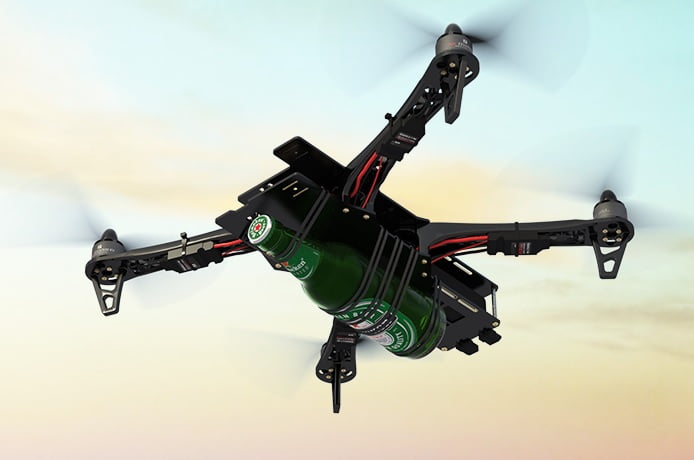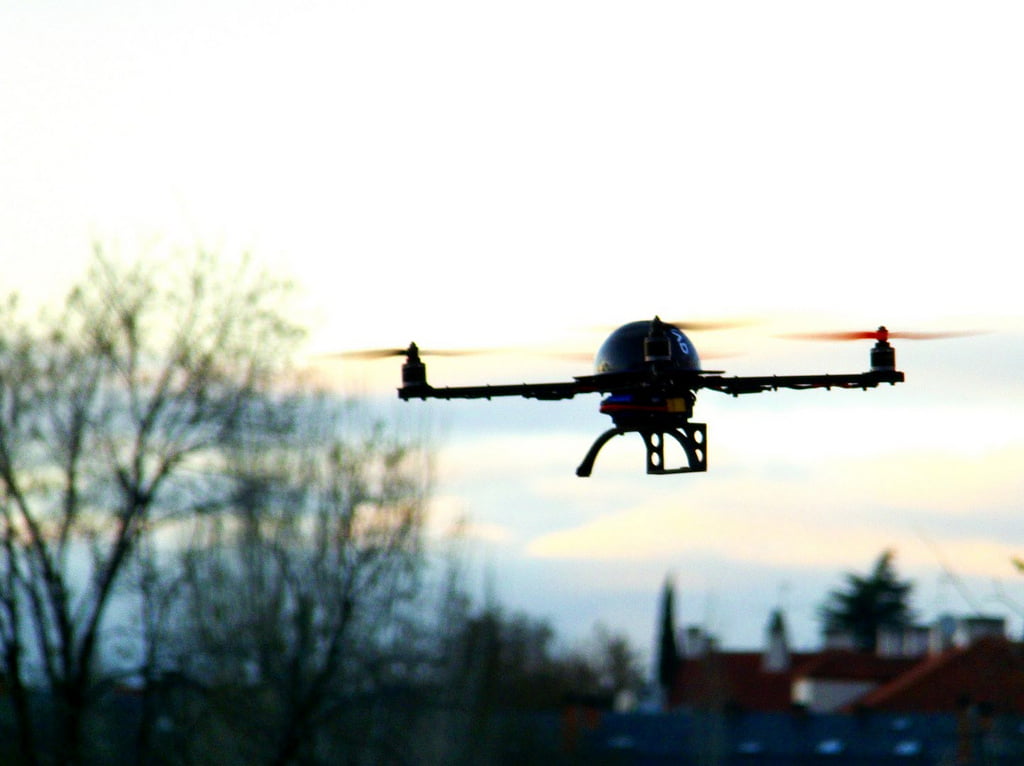For many of us, drones are objects from science fiction or far-flung wars. But drones are increasingly becoming commonplace in everyday life, and soon anything from your mail to pizza could be delivered by drone.
Postal services in various countries are starting to adopt drones as a delivery method, and companies like Amazon are on the hunt for the best drone tech.
SEE ALSO: Soon Enough, This Robot Could Be Delivering Your Packages
One of the countries leading the surge in drone innovation is Israel. According to Yariv Bash, founder of drone delivery startup Flytrex, as well as SpaceIL (the Israeli team trying to land a craft on the moon for Google’s space competition Lunar XPRIZE), the number of drone startups in Israel exceeds 30.
“It’s really not surprising that Israel has become a hub when it comes to drones,” Bash tells NoCamels. “Much of the technological know-how that today’s Israeli drone developers have acquired comes from the military. In fact, many of them served in Unit 8200, an Israeli Intelligence Corps unit responsible for collecting signal intelligence (SIGINT) and code decryption.”
According to Bash, Israel exports some 60 percent of the world’s military drones. However, as the proliferation of drones for commercial use increases, demand in the non-military sector will increase as well.
SEE ALSO: ‘Flytrex Sky’ Personal Delivery Drone Will Ship Goods To Your Location Within Minutes
Delivery by drone
The advantages of delivery by drone are many. Drones can deliver packages much quicker than regular messenger services, as they don’t have traffic to contend with. In fact, the Ukrainian postal service has teamed up with Yariv Bash’s Flytrex to begin testing delivery drones in Ukrainian cities for the first time.
“A drone costs much less than a delivery truck and operates on batteries instead of costly fuel. Plus, maintenance for drones is also much cheaper,” Bash says. “There is also the added benefit of safety. Imagine if we could replace many of the delivery trucks and bike messengers on our roads – which are involved in far too many accidents – with drones. Not only would delivery be cheaper, faster, and more efficient, it would be safer too.”
Delivery by drone is even spreading to Africa, where it is being considered as a more efficient solution for transferring medical supplies between remote villages, as medicine is so lightweight.
Israel: Drone home
Israel’s many drone startups are not all doing the same thing.
Sign up for our free weekly newsletter
SubscribeOne such company, Airobotics, is building a drone platform that will allow companies to operate drones themselves, without the need for expensive and skilled drone operators. The Airobotics system is a patrol drone comprised of three components. There’s the drone itself, the base station known as the “Airbase,” and the command software that takes the place of human brains (or at least, their functions). Capable of flying with a 1 kilogram load for half an hour at a time, the drone can patrol an area, then land itself on its base station autonomously. From there, a robotic arm comes in to change its battery and relieve the drone of its payload — sort of like a robotic pit crew. Airobotics currently has 70 employees and has so far raised a total of $28.5 million in funding.
Arbe Robotics, which won first place at the TechCrunch’s first-ever Tel Aviv Startup Pitch Off in June, has developed a solution that uses radar technology — radio frequencies — to help drones detect objects and avoid collisions. A mix of hardware and software, their product can be connected to all kinds of existing drones. It will enable the craft to read the 360-degree space around it and will allow a visual range of up to 200 meters. “Today drones are not allowed to fly in areas in which a collision could be dangerous,” Kobi Marenko, the Co-Founder and CEO of Arbe Robotics said in an interview. “Our system tells the drone to automatically avoid the obstacle, and it can also include an alarm mode to alert the operator about an imminent danger.”
Another innovative Israeli drone startup is Rosh Haayin-based Percepto, which is putting military-grade tech at the service of the renewable energy sector. It uses machine vision that allows drones to check and inspect windmills in remote areas. The project has won the financial backing of billionaires such as Mark Cuban, Richard Parsons, and Xu Xiapong. Percepto has raised $1 million in funding so far.
Monitoring by drone can be life-saving
Drones are also being used for monitoring agriculture, livestock, farming, and irrigation. Bash points out that drones are much safer to use when checking things like power lines or monitoring crops. “A pilot can only get so close without risking his own safety,” Bash explained. “Drones can get much closer without endangering human life.”
However, replacing human delivery with drones has some drawbacks. One issue the industry is grappling with is how to drop off a package. Some companies have tested landing on a customer’s doorstep while others have tried lowering packages down on a line. But global-positioning-system data can be inaccurate—enough to put a drone at the wrong house or over a swimming pool.
A drone in every home?
Asked whether he believes that soon each family will have their own personal drone, Bash was not prepared to go that far. “Drone adoption will indeed happen gradually, within the next 5-10 years , but I don’t believe it will lead to a world where everyone will have their own drone,” Bash said. “Rather, drones will be commercial. If you order a pizza, it will be delivered to you by drone. If you are expecting a package, instead of a delivery truck pulling up to your home, a drone will land in your yard. The companies will be owning and using the drones, but the general public will be benefiting from it.”
Nothing to fear
Asked if mass drone adoption is something we should dread, Bash dismissed the notion. “A hundred years ago people feared cars in the streets, until it became the norm. The same initial fear applied to air travel, but now flying in a plane is even safer than driving a car. As far as drones go, in the not too distant future, delivery by drone will seem like the most natural thing to all of us.”
Photos and videos: Courtesy
Related posts

Editors’ & Readers’ Choice: 10 Favorite NoCamels Articles

Forward Facing: What Does The Future Hold For Israeli High-Tech?

Impact Innovation: Israeli Startups That Could Shape Our Future





Facebook comments